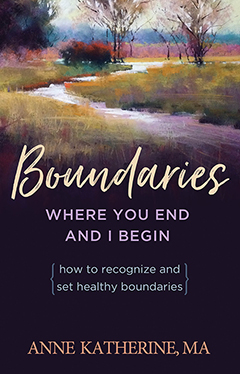
"A clean, clear boundary preserves your individuality, your you-ness."

Other titles you may like.
Visit Recovery Road to view and listen to all the episodes.
Episode 18 -- June 5, 2020
Recovery and the Pandemic: Emotional Boundary Basics
We're all facing some new and challenging interpersonal situations these days. Maybe you and your partner are negotiating space and schedules at home. Maybe your boss wants you at work but you're concerned about exposure to illness. Maybe you're struggling to stay connected to friends and family from a distance. Situations like these require boundaries. In her book, Boundaries: Where You End and I Begin, Anne Katherine show us how each challenge is an opportunity to assert who we are, and what we truly need to live happy, healthy lives. In this excerpt, she reviews the basics of emotional boundaries, and how we can tell if our boundaries may need some attention.
This excerpt is from Boundaries by Anne Katherine. It has been edited for brevity.
Emotional boundaries define the self. Assaults to boundaries threaten the self. One's unique self is composed of a complex of ideas, feelings, values, wishes, and perspectives that are duplicated by no other. Emotional boundaries protect this complex.
What strengthens emotional boundaries? The right to say no. The freedom to say yes. Respect for feelings. Support for our personal process. Acceptance of differences. Enhancement of our uniqueness. Permission for expression.
What harms emotional boundaries? Ridicule. Contempt. Derision. Sarcasm. Mockery. Scorn. Belittling feelings. Stifling communication. Insistence on conformity. Arbitrariness. The need to overpower. Heavy judgments. Any kind of abuse. Abandonment. Threat. Insecurity.
On one end of the scale is serious abuse and neglect. But what about some milder examples of ways we rough up our emotional boundaries?
Think of the effect it has to pretend you're different than you really are. Being someone you're not lets alien behavior and attitudes enter your boundary and replace your true self. When we do this a lot, we begin to feel strange to ourselves. We can lose touch with our true selves and not know what we really want and need.
A clean, clear boundary preserves your individuality, your you-ness. You are an individual, set apart, different, unique. Your history, experiences, personality, interests, dislikes, preferences, perceptions, values, priorities, skills--this unique combination defines you as separate from others.
When you share yourself honestly, when you reveal your own thoughts and reactions, you define yourself emotionally both to yourself and to others. When you pretend to take on another's views, when you conceal your conflicting opinion, you obscure your boundaries for yourself and for others.
If you smile at a joke you find offensive, how does it feel? If you pretend to hold a political opinion contrary to your real views, what happens inside you? Denying your true self feels bad. But sometimes we feel we have to do it, usually when our survival is in some way threatened.
Has this ever happened to you? Here are some other ways you can deny your true self and weaken your emotional boundaries:
- Pretending to agree when you disagree by saying, "I love that color." (But you really hate that color.)
- Concealing your true feelings by saying, "I wasn't hurt." (But you were terribly hurt.)
- Declining to join an activity you really want to do by saying, "No thanks, you guys go ahead." (But you're aching to belong.)
- Pushing yourself beyond your limits
- Working too hard or too long
- Doing too much for others
- Not resting when tired
- Ignoring your needs
- Insufficient sleep
- Too little or too much alone time
- Too much or too little exercise
- Insufficient contact with people who truly care about you
- And using substances or compulsions to avoid yourself
- One, increase your self-awareness.
- Two, identify childhood violations and the offenders, ask yourself how you feel about them, and get care for that damage from a trained professional.
- And three, examine the state of your boundaries in your present relationships and clean them up.
Sound simple? It's simple but not easy. The good news is as you delve into one aspect of boundary building, the other two will be helped. For example, as you become more aware of yourself, you very likely will realize more and more ways your boundaries were violated as a child. As you heal from these violations, internal boundaries will grow, and you'll find yourself creating boundaries in present relationships.
There is plenty of work to be done by you, for you. Read more about how to navigate life's challenges in Boundaries by Anne Katherine.
About the Author:
Anne Katherine, MA, worked as a licensed therapist in a variety of settings for forty years before retiring in 2011. She has led many popular workshops, conferences, and retreats, and is the author of many books including Boundaries: Where You End and I Begin and Boundaries in an Overconnected World.
© 1991 by Hazelden Foundation
All rights reserved


